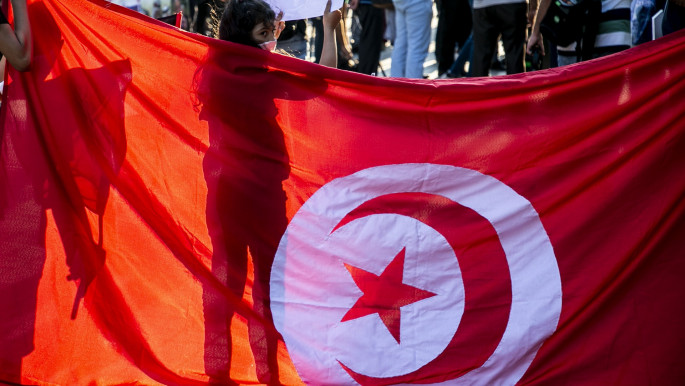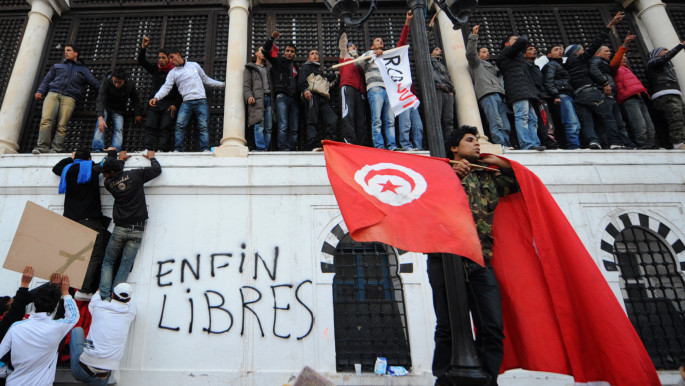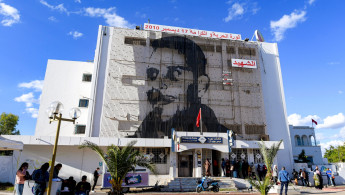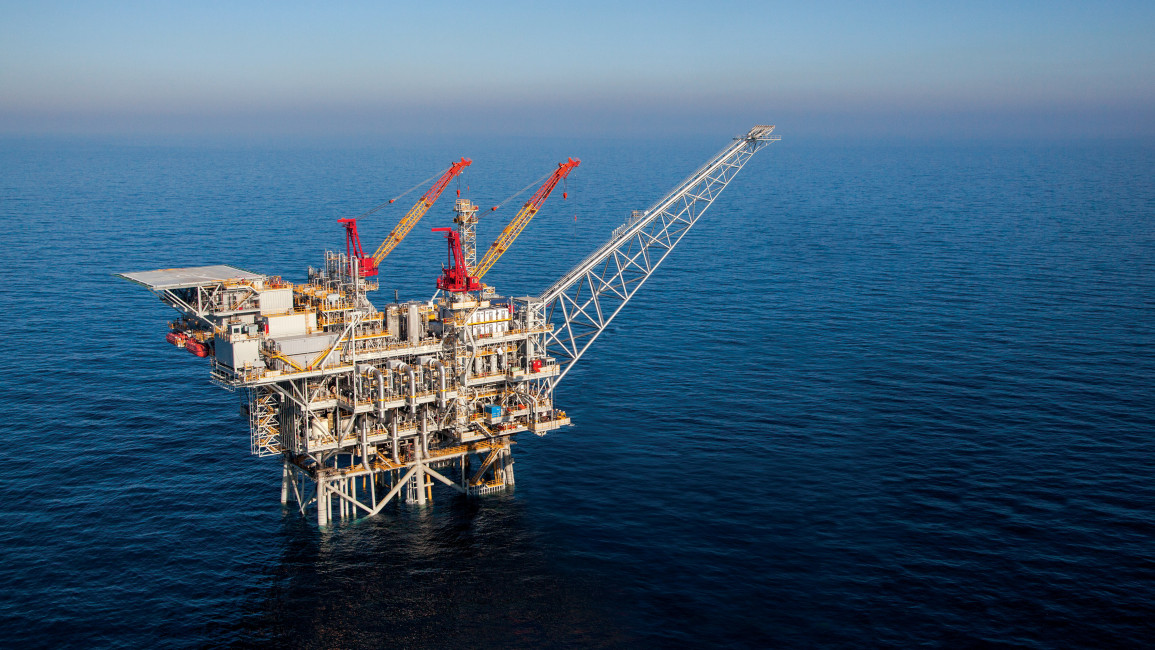A decade on, Tunisia's revolutionary demand for economic justice remains unmet
A decade after the Arab Spring, Tunisia is failing to meet the goals of dignity and employment that drove the 2010-2011 popular protests, as deteriorating socioeconomic conditions coupled with political instability cripple the country's revolutionary course.
Back in 2011, the slogan "work, freedom and dignity" best summarised the core demands of the revolutionaries who rose up in the town of Sidi Bouzid sparking the Tunisian uprising and what became the Arab Spring.
Although the revolution ousted former autocrat Zine El Abidine Ben Ali and forced him to flee on 14 January 2011, socioeconomic marginalisation - rather than political change - was the original driver that pushed people to the streets mainly in the interior regions.
The North African state, often praised as the Arab Spring's only democracy, has made major gains in the sphere of rights and freedoms, but issues such as employment and living conditions have either stagnated or worsened.
Ten years on, Tunisia is grappling with a persistent economic recession and ongoing political wrangling while citizens have seen few changes in their lives, and the Covid-19 pandemic is compounding the country's crisis.
 |
Socioeconomic marginalisation was the original driver of Tunisia's revolution |  |
Mounir Hassine, coordinator of the Monastir branch of the Tunisian Forum for Economic and Social Rights (FTDES), explained that the economic woes the small Arab nation has faced since the Jasmine revolution can be traced back to the emergence of an export-oriented development model in the mid-1980s.
Heavily relying on a manufacturing industry with low-cost outsourcing and a focus on exporting to Europe, the continued adoption of this structural policy has not generated inclusive growth nor promoted regional development. Instead, the Tunisian economy has remained stuck in low performance with a decline in growth rates, low levels of both local private and foreign direct investment, high unemployment and wage cuts.
 |
|
| Read more: Tunisia: The road to revolution |
"Each of the governments after the revolution has been sticking to the same exclusive development model to the detriment of the most vulnerable social categories, especially the youth and women," the FTDES' coordinator told The New Arab. "We haven't seen any socioeconomic transition until today".
National unemployment, which has been stubbornly widespread since the early 1990s, currently exceeds 15 percent, with higher rates found among university graduates (around 30 percent), disproportionately affecting young people in the country's long-marginalised interior.
GDP growth collapsed from its pre-2011 annual average of five percent to a meagre one percent in 2019 following two years of rebounds. The International Monetary Fund (IMF) forecast it would fall to –4.3 percent in 2020 due to the Covid-19 outbreak. Inflation is relatively high, standing at about six percent. Public debt, external for the most part, rose by 95 percent between 2010 and 2019, according to the African Development Bank (ADB).
The percentage of poor and those vulnerable to poverty was expected to increase from 16.6 to 22 percent of the total population in 2020, based on forecasts by the World Bank.
 |
Deteriorating socioeconomic conditions coupled with political instability have crippled Tunisia's revolutionary course |  |
Longstanding social and regional disparities, which contributed to the grievances that led to the 2011 uprising, are continuing. Public investment and economic activities are highly concentrated in coastal areas, leaving the interior with very few employment opportunities, which has led to a massive exodus toward the coast.
Mohamed Kouni, assistant professor of economics at the University of Gafsa, underscored that, for decades, only "20 percent" of the national budget has been going to the hinterlands, whose overall area encompasses more than half of Tunisia's governorates. The result is a complete absence of development projects, poor public infrastructure and services and scarce opportunities in these long-neglected regions.
The economist pointed to three types of structural "dualism" that plague the country's economic performance: geographic, in terms of regional inequalities; a labour market divided between a regularly employed workforce with fixed salaries and social protection coverage, and poorly-paid irregular workers without income security and social protection; and a divide between off-shore, exporting companies that are mostly located in the coastal urban regions, and on-shore companies operating in the internal rural regions.
 |
|
| Read more: Tunisia's rocky path to democracy: Fighting to advance the hard-won freedoms of the revolution |
Kouni raised the issue of the Tunisian labour market being unable to create enough jobs, especially skilled posts, for a growing number of university graduates. That is reflected in a "structural mismatch" between the increasing supply of skilled workers and the low quality of jobs available in terms of value-added and mostly in the informal sector, offering low wages and no job security.
"90 percent of Tunisian businesses are made up of small-sized companies, if not micro-enterprises, that cannot hire the large flow of graduates," he told The New Arab. "Besides the inability of small firms to absorb qualified youths, the quality of graduates seeking to enter the job market has been decreasing in recent years making them uncompetitive or not equipped with the required competencies," the economics professor added.
With hundreds of thousands of jobless graduates, an economy struggling to take off, rampant inflation and growing public debt, social discontent is escalating.
 |
Longstanding social and regional disparities which fuelled the 2011 uprising have continued |  |
Tunisia saw over 7,000 protest movements spring up in 2020 alone, according to FTDES' executive director Alaa Talbi. During the last few months alone, the country has witnessed several movements of social unrest erupting across different regions through various forms, including demonstrations, sit-ins, strikes, and blockades of production.
"The struggle will go on until a fair and equitable model is established to fulfil the demands of the Tunisian people, particularly the economically and socially vulnerable," Hassine said, alluding to the lower and middle classes who continue to bear the brunt of the prolonged economic paralysis.
At the same time, irregular migration has increased with a record rise in sea crossings observed in the past year. The Italian Interior Ministry reported that 12,883 Tunisian nationals crossed the Mediterranean into Italy in 2020 in search for better opportunities in Europe despite the dangers of the journeys.
One critical factor that explains the North African country's combined chronic economic fatigue and social malaise is the ongoing political crisis it has experienced since the revolution.
Since 2011, Tunisia has seen at least eight successive short-lived governments, each lasting one year, with the exception of the three-and-a-half-year-old government of Youssef Chahed from August 2016-January 2020.
Political instability has stalled economic and political reform amid rising frustration amongst the population with the inability of the post-2011 political establishment to provide concrete answers to pressing everyday problems.
The democratic transition has not come with economic equality. Wealth and control of the economy are still concentrated in the hands of a small elite. Corruption, which was previously relegated to the highest spheres of power, appears to have spread to most levels of society.
"A democracy that doesn't sit on economic and social rights for the majority of its citizens is a weak democracy that doesn't represent or embody the values of equality, justice and dignity upheld by the revolution," Olfa Lamloum, Tunisia country director at International Alert, said in an interview with Mediapart.
 |
A democracy that doesn't sit on economic and social rights for the majority of its citizens is a weak democracy that doesn't represent or embody the values of equality, justice and dignity upheld by the revolution |  |
The coronavirus pandemic has made matters worse for the already fragile Tunisian economy. The economic impact of national lockdown measures is particularly affecting the informal economy, which represents nearly 40 percent of the GDP and over 30 percent of employment, tourism, and the industrial sector. It will also have far-reaching effects on the country's interior regions.
At the beginning of last month, the Tunisian General Labour Union (UGTT) proposed a national dialogue, which president Kais Saied is expected to launch soon, to "correct" the revolution's process and find political, economic and social solutions to the current situation.
The initiative is said to include political parties and youth from all regions. Yet, whether the strategy will succeed in its goal is unclear. Prior to accepting to lead the national debate, Saied had demanded the participation of young people from all regions, without, however, specifying the form and methods of this participation.
Also, the president had asked for the exclusion of certain political parties from the talks, including the ultra-conservative Karama coalition - also excluded by the UGTT - the Free Destourian Party (PDL) led by Abir Moussi and media mogul Nabil Karoui's Qalb Tounes.
While the dialogue initiative is aimed at finding a possible way out of the crisis facing the country, its objectives have not been made clear, and preventing some parties from participating in national efforts may prove divisive at a time when the political establishment needs to put party disputes aside and work towards the common good.
Alessandra Bajec is a freelance journalist currently based in Tunis.
Follow her on Twitter: @AlessandraBajec



